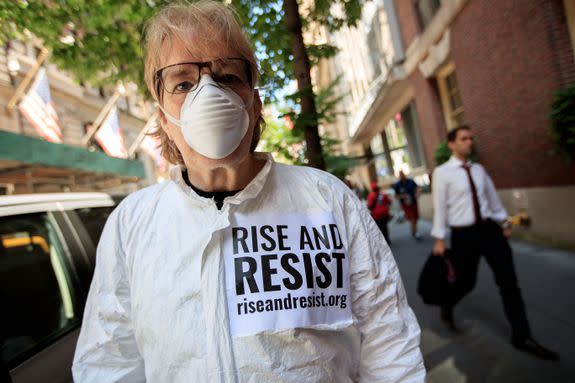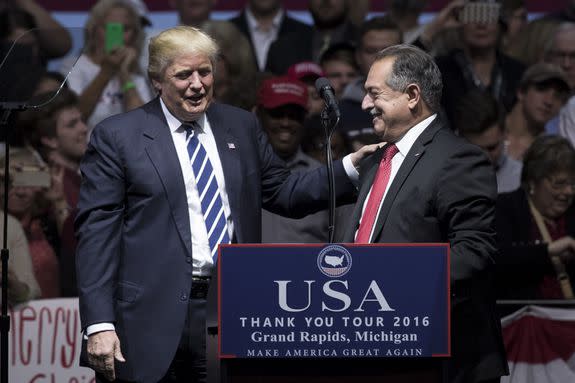EPA chief under fire for allowing Dow pesticide after talking to the company's CEO

A U.S. senator is demanding answers after news broke that Scott Pruitt, head of the Environmental Protection Agency (EPA), spoke with the CEO of Dow Chemical in March — just weeks before Pruitt rejected a petition to ban the company's pesticide.
SEE ALSO: Trump might pick a non-scientist to be USDA's 'chief scientist'
Chlorpyrifos — which is sprayed on U.S. crops like corn, wheat, and strawberries — can potentially cause impaired brain function in children and lead to acute poisoning of farm workers, according to the EPA's own scientists. Dow Chemical says the science is inconclusive.
In a June 29 letter, Sen. Tom Udall (D-N.M.), the ranking member on the Senate Appropriations subcommittee that oversees the EPA's budget, asked Pruitt to explain why he found other studies to be "more robust" than that of his own agency, especially in light of the chemical's potential risks.

Image: Drew Angerer/Getty Images
Udall sent the letter after the Associated Press reported that Pruitt spoke with Dow CEO Andrew Liveris on March 9, which was 20 days before Pruitt rejected a petition filed by two national environmental groups asking the EPA to ban all uses of chlorpyrifos.
AP has since corrected its June 27 report.
Pruitt and Liveris were scheduled to meet on March 9 for about 30 minutes at a hotel in Houston, according to records obtained by the AP through several Freedom of Information Act requests. Both men were there to speak at a major energy industry conference.
EPA spokeswoman Liz Bowman said the meeting was canceled, though Pruitt and Liveris did have a "brief introduction in passing," AP clarified on July 1.
Bowman previously told the AP that Pruitt was "briefly introduced" to Liveris at the conference but that the two men did "not discuss chlorpyrifos."
Weeks after that introduction, on March 29, Pruitt upheld agricultural use of the chemical, citing the need for "regulatory certainty" and "sound science in decision-making."

Image: Drew Angerer/Getty Images
Pruitt's decision reversed the former Obama administration's finding that the 52-year-old pesticide is potentially too risky to keep spraying on our crops.
EPA scientists reached that conclusion last year after extensively reviewing studies that pointed to the pesticide's potential health problems, including learning and memory declines in people who are exposed through drinking water and other sources.
One of those studies, by Columbia University researchers, found that children exposed to effects of chlorpyrifos in the womb had persistent "disturbances" in their brains throughout childhood.
The EPA banned the chemical for most household settings in 2000, after finding the pesticide — used in common products like Raid sprays and Black Flag ant killer — posed an "unacceptable" health risk, particularly to children.
Yet about 40,000 farms in the U.S. still use the chemical on about 50 different food crops.

Image: FAROOQ KHAN/EPA/REX/Shutterstock
In 2007, the Natural Resources Defense Council and the Pesticide Action Network petitioned the EPA to ban food uses of chlorpyrifos. Later, they sued the agency to compel a ruling on their petition. After the Obama administration proposed a ban in 2015, a court order compelled the agency to issue a final rule by March this year.
That forced Pruitt to make a decision, and he acted in Dow's favor. According to the EPA's website, the agency will "continue to review the science addressing neurodevelopmental effects and complete our assessment by October 1, 2022."
Disturbing. Which is more important to Pruitt—Dow Chemical or children’s health? EPA must act now to ban Chlorpyrifos. https://t.co/Y8A7pgnISX
— Tom Udall (@SenatorTomUdall) June 27, 2017
Sen. Udall urged the EPA to act immediately to stop use of chlorpyrifos, writing: "Delay will only result in additional and unnecessary exposures by farm workers and children who continue to have chlorpyrifos experimented on them while the rest of the scientific community has determined there is reasonable cause for danger."
UPDATE: July 2, 2017, 11:20 a.m. EDT The Associated Press said it erroneously reported that EPA Administrator Scott Pruitt met with Dow Chemical CEO Andrew Liveris for about a half-hour at a Houston hotel. This story has been updated to reflect the AP's correction.
WATCH: How to turn your kitchen into a tiny produce farm

